New Delhi: Earlier this week, at the BJP’s invitation, no fewer than 38 parties came together to revitalise the National Democratic Alliance (NDA), with some summoned from remote reaches of the political wilderness.
Going by their electoral track record, this bunch may not look very impressive at first glance — nine did not contest the last Lok Sabha election, 16 drew a blank, and seven won only one seat each.
However, in the BJP’s calculus, these parties all now have a role to play, however small, ahead of the 2024 Lok Sabha elections.
The list of new NDA constituents shows an attempt to rebuild the alliance in states where the BJP lost significant partners, including in Maharashtra, Bihar, and Punjab. Further, 11 of these 38 parties are from the northeastern states that send 25 members to the Lok Sabha.
ThePrint takes a look at all 38 parties and what they bring to the BJP’s table.
Also Read: Why BJP’s keeping its 37 NDA allies close, even though they notched just 29 Lok Sabha seats in 2019
Tamil Nadu & Puducherry
All-India Anna Dravida Munnetra Kazhagam
The AIADMK has had an on-again, off-again alliance with the BJP over the years.
The association dates back to 1998, when the Vajpayee government came to power, and then famously fell when the AIADMK withdrew its vote in 1999.
The BJP and AIADMK next joined hands for the 2004 Lok Sabha elections. However, when the BJP came to power in 2014, the AIADMK chose to stay away from the alliance.
In the lead-up to the 2019 Lok Sabha election, the two parties formalised their alliance once again. In that election, the AIADMK contested 22 seats but managed to secure only one victory — the NDA’s only win in the state.
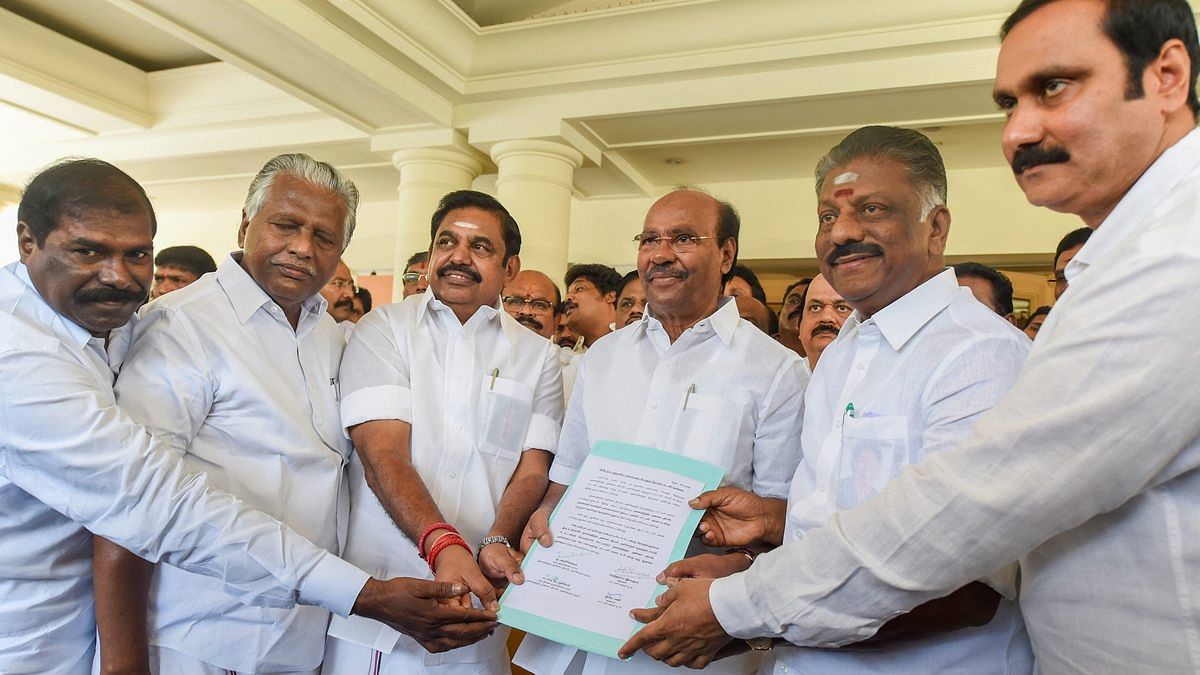
Nevertheless, the regional party garnered a significant share of over 19 per cent of the total valid votes in the state.
The alliance persisted through the 2021 assembly election in Tamil Nadu, which the Dravida Munnetra Kazhagam (DMK) won.
As the BJP seeks to make inroads into the Dravidian political landscape, its partnership with AIADMK remains vital to strengthen its position in Tamil Nadu, a state that contributes 39 Lok Sabha members.
Tamil Maanila Congress
The Tamil Maanila Congress has existed in various iterations since the mid-1990s but emerged in its current form under the leadership of former Congress Union minister G.K. Vasan in 2014.
In the 2019 Lok Sabha elections, it became part of the NDA. Joining as the eighth partner in the BJP-AIADMK alliance, alongside Pattali Makkal Katchi (PMK) and other parties, it contested from one seat — Thanjavur — but lost.
Pattali Makkal Katchi
Led by Anbumani Ramadoss, a former health minister in the first Manmohan Singh government, the PMK has a significant support base among the Vanniyar community in Tamil Nadu. It was founded by S. Ramadoss, Anbumani’s father.
The party contested on seven seats as a part of the NDA in 2019. While it failed to win a single seat, its vote-share stood at over 5 per cent.
Puthiya Tamilgam
Puthiya Tamilgam was founded by K. Krishnaswamy in 1997 and has a vote bank among the Pallars, a Dalit community in Tamil Nadu. The party has contested assembly elections with both the AIADMK and DMK, winning two seats in 2011.
The party joined the BJP-AIDMK-PMK alliance in 2019. Its founder Krishnaswamy has spoken in favour of the BJP’s ideological fountainhead, the Rashtriya Swayamsevak Sangh (RSS), referring to it as a “nationalist” organisation. He has also refuted allegations against the BJP of trying to impose Hindi in the state.
All-India NR Congress
The AINRC is the ruling party in Puducherry and is led by the Union territory’s Chief Minister N. Rangaswamy.
The party was formed in 2011 after it split with the Congress. While AINRC won Puducherry’s lone Lok Sabha seat in 2014, it lost in 2019.
The party in an alliance with NDA won the 2021 assembly elections.
Maharashtra & Goa
Shiv Sena (Eknath Shinde)
When the united Shiv Sena’s leader Uddhav Thackeray decided to walk out of the alliance with the BJP after the 2019 Maharashtra assembly election, it came as a shock to the latter. Subsequently, the Shiv Sena formed a three-party coalition government, the Maha Vikas Aghadi (MVA), with the Nationalist Congress Party (NCP) and the Congress.
The next shock came when Sena’s Eknath Shinde rebelled against the MVA government last June and brought it down. He walked away with the backing of 40 of Sena’s 56 MLAs.
The rebel faction joined the NDA and formed a government, with Shinde as CM and the BJP’s Devendra Fadnavis as deputy CM. The Election Commission later recognised the Shinde faction as the ‘real’ Shiv Sena.
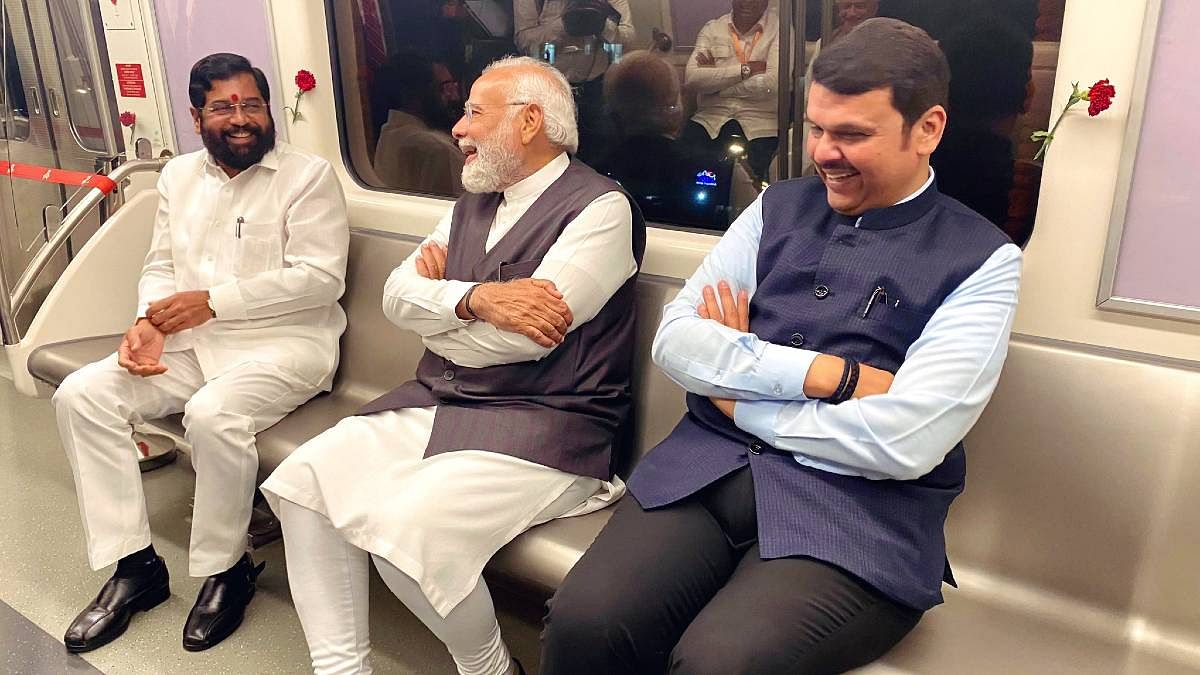
The undivided Sena-BJP alliance had secured 18 Lok Sabha seats with a vote share of 23.5 per cent in 2019.
Currently, 13 of the Sena MPs are part of the NDA. However, the Shinde-led Sena’s electoral strength hasn’t been tested yet.
Nationalist Congress Party (Ajit Pawar)
The freshly minted Ajit Pawar faction of the NCP is another Maharashtrian party that the BJP is banking on to revitalise the NDA in Maharashtra.
Ajit Pawar, claiming the support of 30 of the party’s 53 party MLAs and one out of four MPs, defied NCP chief Sharad Pawar last month and joined the NDA. Presently, Ajit Pawar shares the post of deputy CM of Maharashtra with Fadnavis.
While a fractured NCP benefits the BJP, there’s a question mark on Ajit Pawar’s ability to sway NCP voters away from his uncle and party founder, Sharad Pawar. Ajit’s rebellion, notably, was prompted by Sharad Pawar’s decision to designate his daughter, Supriya Sule, as his political successor.
Republican Party of India (Athawale)
The RPI (A) is led by Ramdas Athawale, Union Minister of State for Social Justice and Empowerment. The party has influence among sections of the Dalit community. In the 2019 assembly election, six of its candidates contested on a BJP ticket. But in the Lok Sabha polls that year, the BJP-Sena combine did not spare a single seat for the RPI(A) to contest.
Although Athawale’s party has been on the wane, maintaining an alliance with it helps the BJP with its outreach to Dalits in Maharashtra.
Rashtriya Samaj Paksha
The Maharashtra-based RSP was founded by Mahadev Jankar, a former member of the Bahujan Samaj Party (BSP), in 2003.
In the 2019 Lok Sabha elections, the party contested 11 seats but failed to win any, obtaining a vote share of only 0.013 per cent.
The RSP’s support base lies among the Dhangar (shepherd) community in certain areas of western Maharashtra and Marathwada.
In May, Jankar had threatened to leave the NDA if the RSP was not given four Lok Sabha seats.
Prahar Janshakti Party
Another party from Maharashtra, the PHJSP was founded by Omprakash Babarao Kadu in 1999.
In the 2019 Maharashtra assembly elections, the PHJSP contested 26 seats and won two, with a vote share of 5.29 per cent.
Kadu was sworn in as a minister in the Uddhav Thackeray led government in 2019, but later withdrew his support to back the Eknath Shinde faction of the Shiv Sena. His party currently supports the BJP-Shiv Sena-NCP (Ajit Pawar) coalition government.
Jan Surajya Shakti
JSS was founded by Vinay Kore, a former state minister for non-conventional energy and horticulture.
In the 2019 Maharashtra assembly elections, the JSS fought on four seats, winning one seat and garnering an overall vote share of 21.34 per cent in the constituencies it contested.
Kore is the lone MLA of the party, representing Shahuwadi constituency in Kolhapur district.
Maharashtrawadi Gomantak Party
The MGP was founded by Dayanand Bandodkar, who became the first CM of Goa in 1963, two years after the Portuguese rule ended.
The MGP initially formed an alliance with the BJP in 1994 but later broke away. The alliance was reestablished in 2012 but was severed again in 2017.
However, after the 2017 assembly elections, the MGP rejoined the alliance and became part of the Manohar Parrikar-led BJP government in the state.
During the 2022 assembly elections in Goa, the MGP contested 13 seats and secured two victories, achieving a vote share of 21.37 per cent in the seats it contested.
Bihar & Jharkhand
Lok Janshakti Party factions
The LJP, founded by the late Ram Vilas Paswan, is currently divided into two factions due to yet another uncle-nephew feud. While the Lok Janshakti Party (Ram Vilas) is led by Paswan’s son Chirag, the Rashtriya Lok Janshakti Party is helmed by his brother, Lok Sabha MP Pashupati Paras.
After Ram Vilas Paswan’s death in 2020, Paras challenged Chirag’s leadership and led five MPs away from the latter’s faction. Paras was then given a cabinet berth in the Modi government. However, Chirag continues to hold popular appeal.
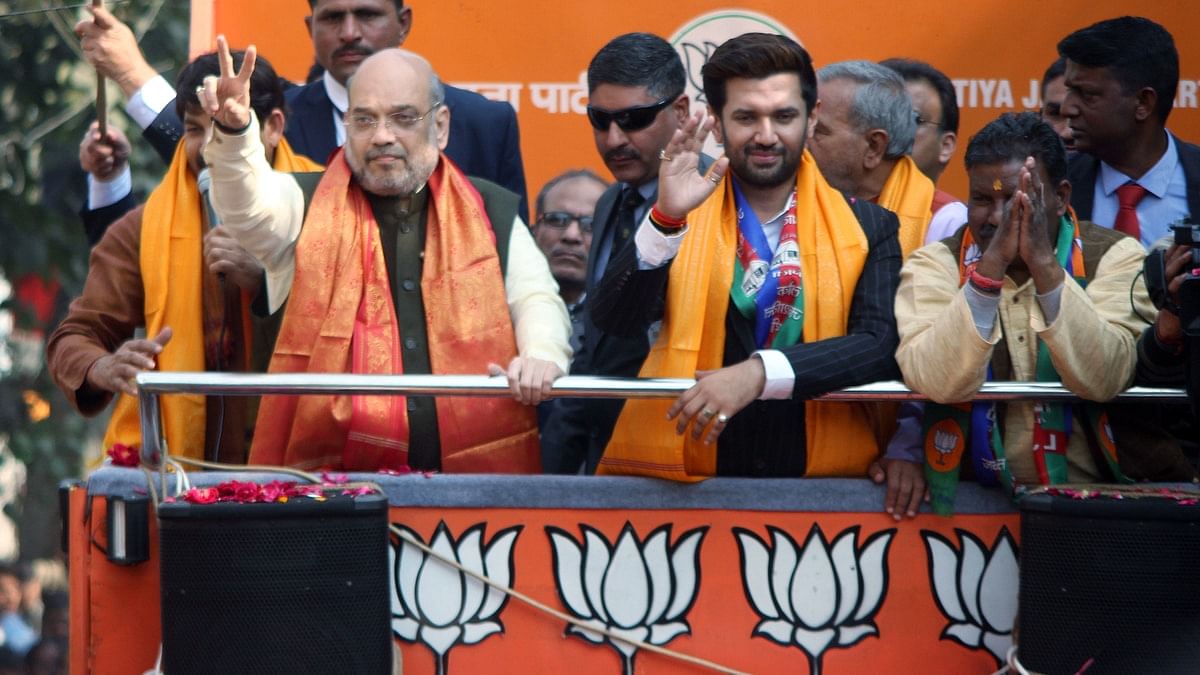
The BJP has been trying to broker peace between uncle and nephew but it hasn’t materialised yet. Nevertheless, Chirag returned to the NDA fold this month.
In the 2019 LS elections, the unified LJP contested six seats and secured victories in all of them in Bihar, garnering a share of over 8 per cent of valid votes polled.
In the 2020 Bihar assembly election, the unified LJP obtained 10.26 per cent of votes on seats it contested. Notably, during the 2014 Lok Sabha election, the LJP, in alliance with the BJP and Upendra Kushwaha’s Rashtriya Lok Samta Part (RLSP), won 31 out of 40 seats in Bihar. The party has a substantial vote bank among the Paswan (Dalit) community, which comprises around 6 per cent of the state’s population.
Hindustani Awam Morcha (Secular)
Former Bihar CM and HAM(S) founder Jitan Ram Manjhi contested the 2015 Bihar assembly elections in an alliance with the BJP. However, his party won only one seat of the 21 it contested.
In the 2019 Lok Sabha polls, HAM(S) joined forces with the Rashtriya Janata Dal (RJD) and Congress, but registered a duck.
In the 2020 assembly elections, Manjhi switched sides again and joined the NDA. This time around, HAM(S) won four of the seven assembly seats it contested.
When Bihar Chief Minister and Janata Dal (United) leader Nitish Kumar walked out of the NDA last year and formed a government with the RJD, the Congress and the Left parties, HAM(S) too went with him.
Now, Manjhi is back with the NDA. His party has a support base among certain pockets of the Musahar community, which comprises about 4 per cent of Bihar’s population.
All Jharkhand Students Union
The BJP and AJSU, led by Sudesh Kumar Mahto, were allies in the 2014 Jharkhand assembly elections, but parted ways in 2019. The AJSU won the sole seat it contested in the 2019 Lok Sabha elections.
In the assembly elections, it won two seats and a vote share of 12 per cent on the seats it contested.
Uttar Pradesh
Suheldev Bharatiya Samaj Party
OBC leader Om Prakash Rajbhar’s SBSP had broken away from the NDA before the 2019 elections. It did not win any of the 24 seats it contested, but did garner 2.77 lakh votes.
For the 2022 assembly election, SBSP formed an alliance with Samajwadi Party and was able to win six seats.
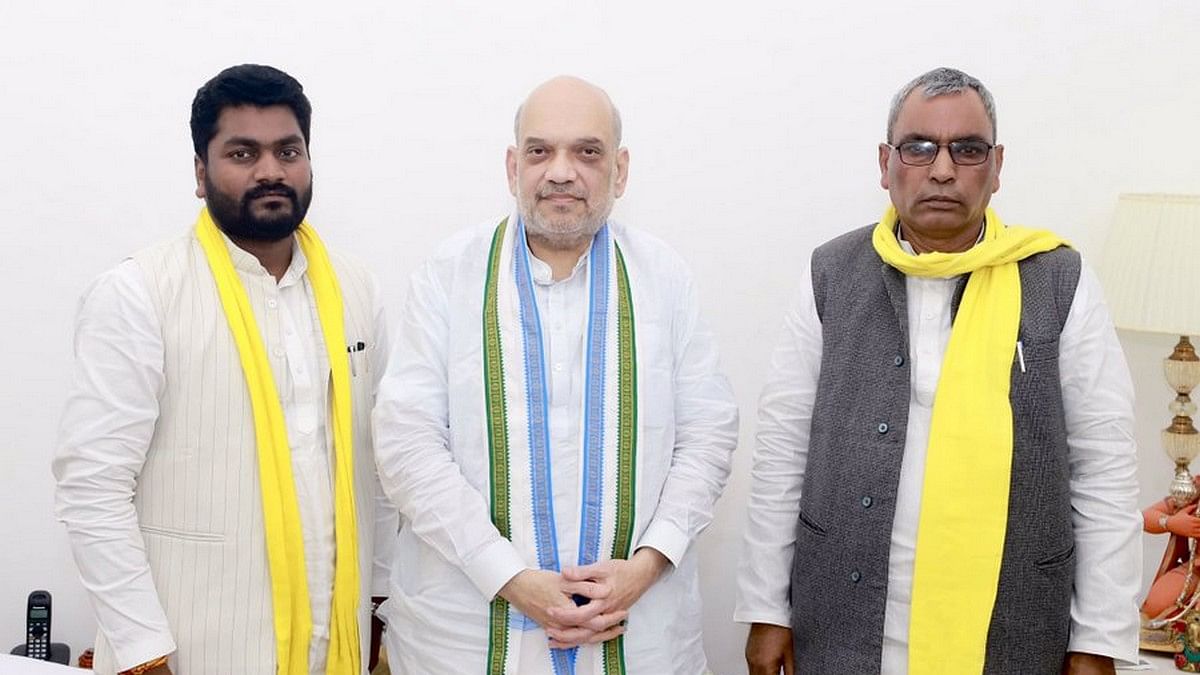
Earlier this month, however, Om Prakash Rajbhar returned to the NDA fold ahead of the 2024 elections.
Apna Dal (Sonelal)
Founded in 1995 by OBC leader Sonelal Patel, the Apna Dal later split into two factions — Apna Dal (Sonelal) led by his daughter Anupriya Patel and Apna Dal (Kamerawadi) helmed by his wife Krishna Patel.
In the 2019 Lok Sabha election, Apna Dal (S), in alliance with the NDA, contested two seats and won both.
Party president Anupriya Patel is currently the Union Minister of State (MoS) for Commerce and Industry.
The party holds significant influence among the Kurmi community, which constitutes about 6 per cent of the population in Uttar Pradesh.
Nirbal Indian Shoshit Hamara Aam Dal (NISHAD)
Founded in 2016 by Sanjay Nishad, NISHAD, also called the Nishad Party, formed an alliance with the BJP in 2022.
Sanjay Nishad’s son, Praveen, won the Gorakhpur Lok Sabha bypoll on a Samajwadi Party ticket in 2018, supported by the BSP, but later joined the BJP.
During the 2022 UP assembly elections, the NISHAD Party won six seats. The Nishad community is considered a significant vote bank in some areas of eastern UP.
North-East & East
Asom Gana Parishad
Formed by former Assam chief minister Prafulla Kumar Mahanta, the AGP is currently led by Atul Bora, who is agriculture minister in the Assam government.
In the 2019 Lok Sabha election, the party unsuccessfully contested three seats as part of the NDA. However, it gathered 8.31 per cent of the valid vote. In the 2021 Assam assembly elections, the party contested 29 seats and won nine. It got 32.91 per cent of the votes in the seats it contested.
United People’s Party Liberal
Assam’s UPPL wields influence in the state’s Bodo areas. In 2020, it formed an alliance with the BJP to govern the Bodoland Territorial Council (BTC).
Led by former MP Urkhao Gwra Brahma, currently a minister in the Assam government, it contested one seat in the 2019 Lok Sabha election, and lost.
During the 2021 assembly elections, the UPPL contested 11 seats in alliance with the BJP and emerged victorious in six.
The UPPL’s alliance with the BJP can help the latter secure votes from the Bodo community, comprising over 31 per cent of Assam’s population.
Indigenous People’s Front of Tripura
Formed in the mid-1990s and having gone through various iterations over the years, the IPFT, then led by the late N.C. Debbarma, came to prominence in 2016 with a demand for a separate state for tribals in Tripura.
In the 2018 state elections, IPFT allied with the BJP, together ousting the 25-year-old Left government. Of the total 60 seats, IPFT won eight with a vote share of 4.2 per cent, while the BJP secured 35. The alliance returned to power in March 2023, with IPFT winning only one seat.
In the 2019 Indian Lok Sabha election, IPFT contested two seats in alliance with the BJP but did not achieve success.
The rise of Tipra Motha, another party advocating for a separate tribal state, is said to have diminished IPFT’s influence among tribals in Tripura.
National People’s Party, Meghalaya
The NPP was founded by P.A. Sangma after his expulsion from the NCP in July 2012 and is recognised as a national party by the Election Commission. Currently, it is led by Meghalaya Chief Minister Conrad K. Sangma and has a presence in several states in the Northeast.
In the 2019 Lok Sabha elections, the NPP contested three seats, one each in Meghalaya, Manipur, and Nagaland. It won its sole seat in Meghalaya, with a vote share of over 22 per cent in the state.
At the assembly level, NPP holds 26 seats in Meghalaya, 7 in Manipur, and 5 in Nagaland (all three states have a 60-member assembly). It is a member of the North-East Democratic Alliance (NEDA), a coalition of political parties from the northeast region that support the NDA.
United Democratic Party
The UDP is part of Conrad Sangma-led Meghalaya Democratic Alliance (MDA) government — which also includes the NPP, BJP, the Hill State People’s Democratic Party (HSPDP), and the People’s Democratic Front (PDF).
Notably, the UDP, which was part of the NPP-BJP government from 2018 to 2023, contested this year’s assembly election independently. It emerged as the second-largest party, securing 12 seats and 16 per cent of the votes. Subsequently, it ended up extending support to Sangma-led government.
The UDP is an offshoot of the All-Party Hill Leaders’ Conference (APHLC), which was formed in 1960 and was the main protagonist of the Hills State movement for a separate state from undivided Assam province.
Hill State People’s Democratic Party
Founded by H.S. Lyngdoh, the HSPDP is one of the three prominent parties in Meghalaya and advocated for a separate state for people from the hills, after which Meghalaya was carved out of Assam.
In the 2023 Meghalaya elections, the HSPDP got two seats and over 3.5 per cent votes.
Mizo National Front
The MNF is the ruling party in Mizoram, with Zoramthanga serving as chief minister. It is also a part of the BJP-led NEDA.
In the 2019 Lok Sabha elections, MNF’s C. Lalrosanga won the only parliamentary seat in Mizoram.
Although the BJP made its debut in the Mizoram assembly in 2018, winning one seat, it has not been able to significantly expand its presence. The MNF and Congress remain the two dominant parties in the poll-bound state.
Nationalist Democratic Progressive Party
Neiphiu Rio from the NDPP is currently the Nagaland chief minister, and since 2003 has been in alliance with the BJP several times. The combine returned to power in March this year.
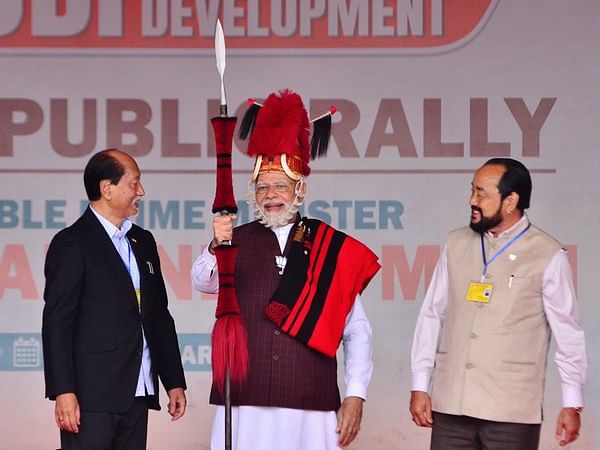
In 2019, the NDPP contested Nagaland’s only Lok Sabha seat and won, getting over 50 per cent of the total valid votes polled.
Naga People’s Front
The BJP and the NPF (earlier called the Nagaland People’s Council) have been on-and-off alliance partners since 1977, when the Janata Party was formed as a political alternative to the Congress.
Ahead of the assembly elections in 2018, the BJP dropped out of its partnership with the NPF and allied with the NDPP.
The NPF supported Congress candidate K.L. Chishi in the 2019 Lok Sabha elections.
In 2021, however, Nagaland became opposition-free as all parties, including the NPF, extended support to the NDPP-BJP government.
Ahead of the 2023 Nagaland assembly election, 21 of the 25 NPF MLAs joined the NDPP. NPF contested 22 seats in the election and won just two.
Kuki People’s Alliance
The Kuki People’s Alliance, which was formed by a former Indian Foreign Service officer Tongmang Haokip in 2022, won two seats in last year’s assembly elections in Manipur, and received over 1 per cent votes of the total votes polled in the state.
Sikkim Krantikari Morcha
The SKM was founded in 2013 by Prem Singh Tamang, currently the CM.
In 2019, SKM secured victory in the sole Lok Sabha seat in the state with 48 per cent of votes.
Gorkha National Liberation Front
Founded by Gorkhaland movement leader Subhash Ghisingh in 1980, the GNLP has been a longstanding ally of the BJP in the Darjeeling hills since 2019.
The support of GNLP has become even more crucial for the BJP since the Gorkha Janmukti Morcha (GJM) parted ways with the BJP and allied with the Trinamool Congress in 2021.
Also Read: 26 Opposition parties have united to fight BJP. Here’s how they fared in 2019 Lok Sabha polls
Kerala
Bharath Dharma Jana Sena
The BDJS is the political wing of the Ezhava outfit, Sree Narayana Dharma Paripalana Yogam, which follows the principles and teachings of social reformer Narayana Guru.
As a Kerala-based ally of the NDA, the BDJS contested and lost four Lok Sabha seats in 2019, getting a vote share of about 1.8 per cent in the state. The party is led by Thushar Vellappally, who contested from Wayanad and lost by a huge margin to Rahul Gandhi.
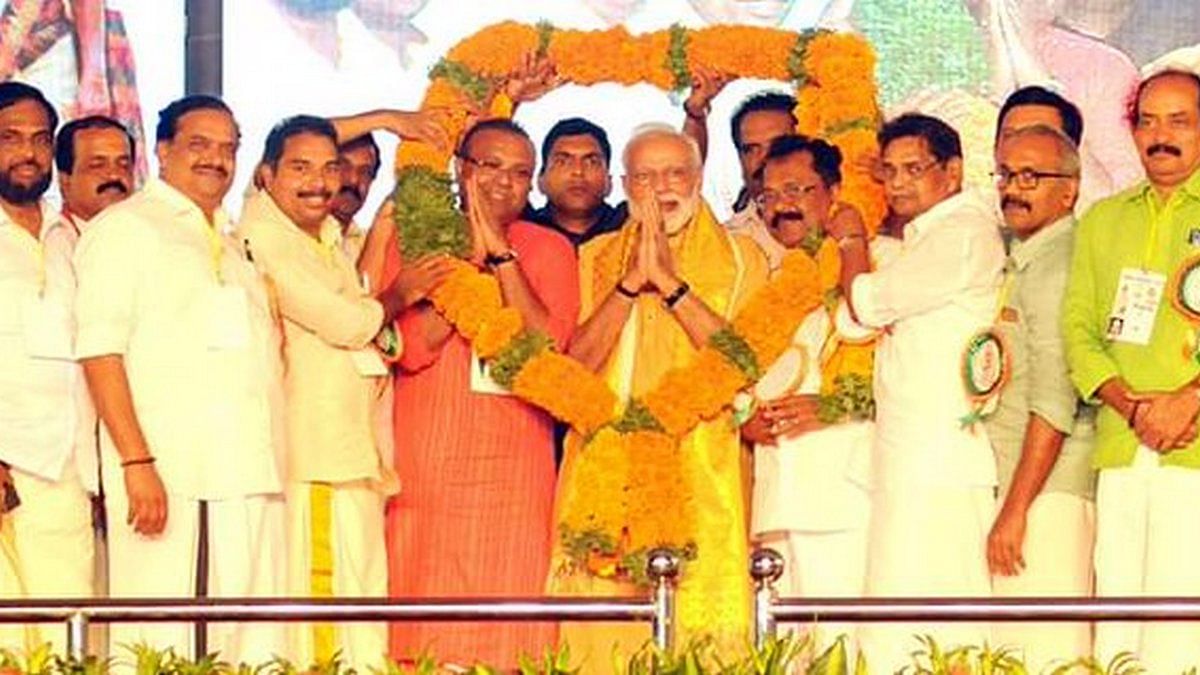
Before the 2021 assembly elections, the BDJS experienced a split, with one faction, Bharathiya Jana Sena (BJS), aligning with the Congress-led United Democratic Front.
Kerala Congress (Thomas)
The Kerala Congress (Thomas), led by former Union minister P.C. Thomas from the third Vajpayee cabinet, has not always had a smooth run with the NDA.
In 2021, the party decided to quit the alliance due to feeling “neglected” in the allocation of seats for the assembly elections in Kerala. While its leaders attended the meeting of BJP allies earlier this week, the party is yet to make its return to the NDA official.
Andhra Pradesh
Jana Sena Party
Founded in 2014 by Telugu actor Pawan Kalyan, the JSP initially chose a red star as its symbol. Kalyan also expressed admiration for guerrilla leader Che Guevara.
However, despite its apparent ideological inclinations, the party supported the BJP in the 2014 assembly and Lok Sabha elections.
In the 2019 assembly elections, the JSP formed an alliance with the CPI(M), CPI, and BSP and won one seat and a vote share of 7.04 per cent. The JSP enjoys considerable influence among the Kapu community.
Haryana & Punjab
Jannayak Janata Party
The JJP was founded by Dushyant Chautala, the grandson of former chief minister O.P. Chautala, in 2018. The JJP is presently part of the BJP-led government in Haryana with Dushyant serving as deputy CM.
In the 2019 Lok Sabha election, the party had joined forces with the Aam Aadmi Party, but neither won a seat.
In the assembly elections that same year, however, the JJP won 10 seats, garnering 14.84 per cent of the total votes polled. It then joined the NDA to help Manohar Lal Khattar become CM again.
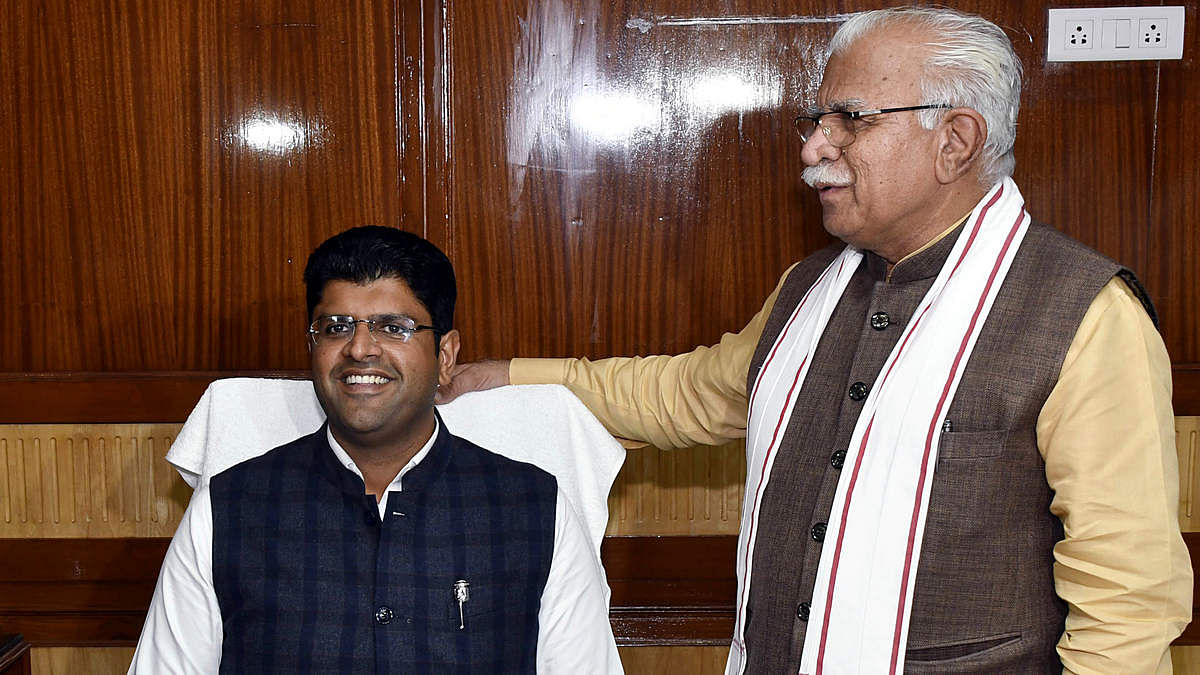
However, there is an element of uncertainty about the BJP-JJP alliance in the 2024 Lok Sabha election, with both parties declaring their intent to contest all 10 Lok Sabha seats separately.
Haryana Lokhit Party
HLP was established in 2014 by Gopal Kanda, two years after he had to quit his post as a minister in the Haryana government amid controversies and legal cases, including one in which he stands accused of abetment to suicide.
Prior to forming the HLP, Gopal Kanda, as an independent MLA from Sirsa, had supported the Indian National Lok Dal (INLD) and later the Congress government.
In the 2019 Haryana assembly elections, the HLP secured over 80,000 votes (0.6 per cent), making it the fifth-largest party in the state.
In 2021, Gopal Kanda’s his brother, Govind Kanda, joined the BJP and unsuccessfully contested the assembly bypoll from Ellenabad.
Shiromani Akali Dal (Sanyukt)
SAD (Sanyukt) is an offshoot of the Akali Dal, resulting from the merger of two other splinter groups— the Shiromani Akali Dal (Democratic) led by Sukhdev Singh Dhindsa and Shiromani Akali Dal (Taksali) led by Ranjit Singh Brahmpura — in 2021.
These parties were formed after their leaders parted ways with SAD (Badal).
In the 2022 Punjab assembly election, SAD (Sanyukt) allied with the BJP and fielded 12 candidates, but did not secure any seats.
(Edited by Asavari Singh)
Also Read: 26 Opposition parties have united to fight BJP. Here’s how they fared in 2019 Lok Sabha polls

